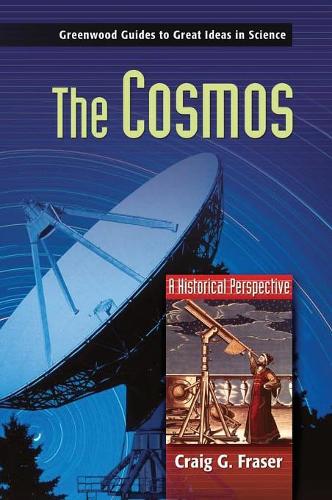
The Cosmos: A Historical Perspective
(Hardback)
Publishing Details
The Cosmos: A Historical Perspective
By (Author) Craig G. Fraser
Bloomsbury Publishing PLC
Greenwood Press
1st July 2006
United States
Classifications
General
Non Fiction
History of science
523.1
Physical Properties
Hardback
200
Description
Everyone knows that the universe is extremely old and extremely large. But how did scientists determine just how old and how large How do astronomers know that there are upwards of 100 billion galaxies in the universe if the nearest one is over 40,000 light-years away How do we know what the stars are made of The answer is that our current knowledge of the universe has arisen from the work and ideas of scientists and philosophers over hundreds of years. While it's only been during the last several decades that scientists have had the technology and theories to really understand how the universe works, humans have thought about such issues for millennia. And the scientists who today are attempting to understand the most complex issues of the universe build upon the work and thought of the thinkers of the last hundreds of years. The Cosmos: A Historical Perspective provides an accessible introduction to the many ways humans have conceived of the universe throughout history and what ideas have led to our current understanding of the cosmos. The book examines: the Scientific Revolution and the new ideas of the Earth's place in the cosmos; the importance of nineteenth-century physics and chemistry in determining the compositions of stars; Einstein's Theory of Relativity and how it altered how scientists thought about gravity; and new, cutting-edge science that may alter, yet again, our conceptions of the cosmos, such as the inflationary universe and the possibility of dark energy. Jargon and mathematics is kept to a minimum, and the volume includes an annotated bibliography and a timeline. The Cosmos is an ideal introduction for students studying space science and the history and nature of the scientific understanding of the universe.
Reviews
The complex relationship between theories (including theories that eventually proved to be incorrect) and observation is a central focus throughout this concise, thought-provoking historical analysis. Highly recommended. Upper-division undergraduates through professionals. * Choice *
[A] good account of the development of cosmology over the last two or three millennia. * Astronomy Now *
From Plato's erroneous promulgation that the planets have circular orbits to calculation in 2003 of Hubble's constant, Fraser offers a lucid introduction to historical perspectives on the nature of the cosmos. The history of Western (including Islamic) cosmology is divided into four periods: early mythologies, classical Greek thought through Copernicus, heliocentric and Newtonian views, and the modern era starting in the 1920s with realization of the multi-galactic nature of the universe. The volume includes a timeline, a glossary, and B&W illustrations. * SciTech Book News *
Author Bio
CRAIG G. FRASER is a professor in the Institute for History and Philosophy of Science and Technology at the University of Toronto. He is the editor-in-chief of the journal Historia Mathematica, and has written numerous articles on the history of modern cosmology.
